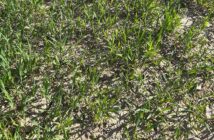A lighter than expected Fusarium risk doesn’t mean growers should cut back on azole rates at the T3 timing. That’s the warning from Bayer’s Tim Nicholson.
He says that just because the threat of mycotoxin producing Fusaria has been checked by wet winter and cool conditions in April and May, growers need to consider the ‘disease spectrum’ at the T3 timing. “Of course Fusaria is a key target but we cannot overlook the foliar threat too. The weather has assisted application timing ahead of ear sprays but it is the final opportunity to ‘top up’ foliar protection, and some crops are perhaps a little dirtier than expected with high levels of Septoria in the lower canopy.”
His advice is to base sprays on a ¾ dose of primary azole active against both Septoria and ear diseases. “Of course growers need to have an eye on input spend and no one wants to spend unnecessarily. But growers need to have an eye on efficacy too.
Secondary azoles such as tebuconazole and metconazole are not active against the entire Fusaria complex and don’t deliver the same foliar potency either.
“We also have to remember that the key risk for Fusaria is humid weather at flowering and the threat could escalate very quickly, therefore I would urge growers to maintain robust rates of prothioconazole,” he concludes.



